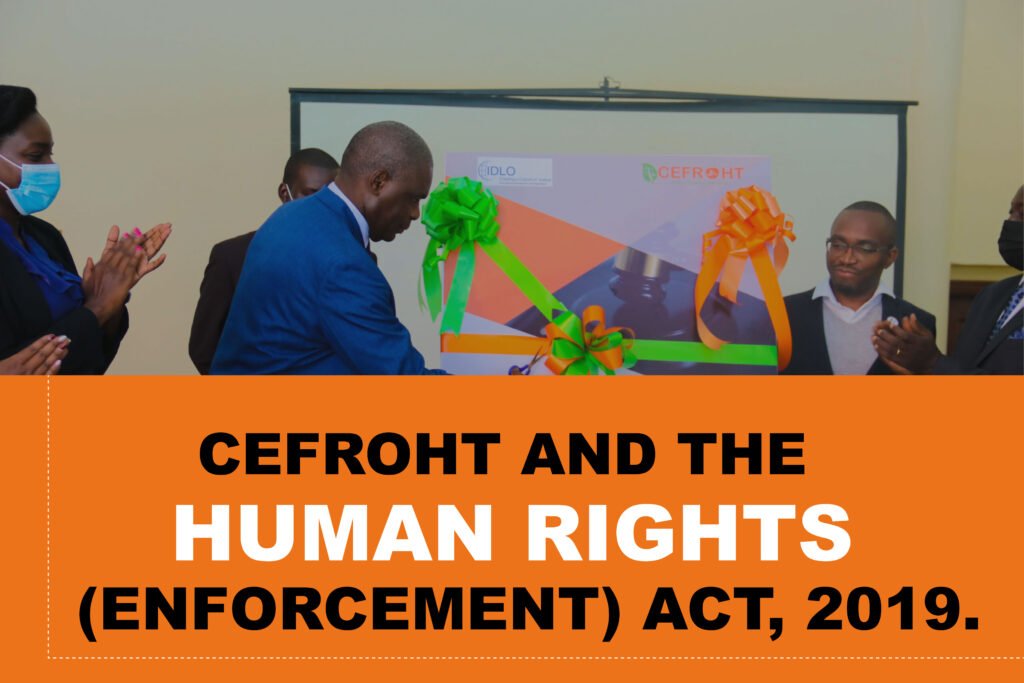CEFROHT AND THE HREA

CEFROHT AND THE
HUMAN RIGHTS
(ENFORCEMENT)
ACT, 2019.
A NOVEL LEGAL TOOL FOR THE REALISATION OF SUSTAINABLE BETTER LIVES FOR VULNERABLE PERSONS IN UGANDA.
1. Enforcement of rights and freedoms by Magistrate Courts: Courts near to people.
SECTION 5
Under this novel law, a Magistrate Court is now authorized to hear and give judgements relating
to the enforcement or violation of human rights including social economic and cultural rights and
in particular to promote the right to food, nature rights, economic rights, adequate living rights
among others.
This novel law allows a person suffering a human rights violation to make their complaint in any
language, orally or in writing or in any form to court.
In case a complainant of a human rights violation makes it orally or in any language other than
English, the Magistrate shall reduce it in writing in the language of court (which is English).
Any person can access court without a lawyer or money involved and can make a claim before a
magistrate.
2. Accessibility for environmental justice, food and economic justice for poor persons enabled.
SECTION 6
An application to a court for a failure to respect a human right, must be made in a court responsible for the area where the failure to respect a human right occurred.
If a victim is not sure about the person against whom to complain against, she or he can complain
about two or more persons and allow the Court to decide which person/s is responsible for the
failure to respect a human right.
The Act allows any person who is an expert on a particular issue before the Court, to provide the
Court with his or her knowledge on the issue; and any person can apply to the Court to provide
his or her knowledge on the issue before the Court, as a friend of the Court. The Court may also
request any person to provide his or her knowledge on the issue before the Court, as a friend of
the Court.
Cases under this law are not bound to timeframes for provision of necessary notices as may be
procedurally required.
Applications to the Court made under this law must not be refused by the Court for failing to fulfil
any procedural or legal requirement
Expansive orders and remedies from court.
SECTION 9: Orders that may be made by court in human rights cases.
Where the court determines that a fundamental right or freedom has been violated,
unlawfully denied or should be enforced, the competent court shall issue orders it
considers appropriate, including an order for compensation.
The court may in addition, order for-
(a) the restitution of the victim to the original situation before the violation of his or her human
rights and freedoms;
(b) the rehabilitation of the victim including the provision of medical and psychological care; or
(i) measures aimed at the cessation of the continuing violation of human rights and freedoms;
(ii) verification of the facts, full and public disclosure of the truth to the extent that such disclosure does not cause further harm or threaten the safety and interests of the victim, the victim's
relatives, witnesses, or persons who have intervened to assist the victim or prevent the occurrence of further violations;
(iii) restoring the dignity, the reputation and the rights of the victim and of persons closely
connected with the victim;
(iv) public apology, including acknowledgement of the facts and acceptance of responsibility;
(v) criminal and other judicial and administrative sanctions against persons liable for the
violations;
(vi) guarantees of non-repetition;
(c) Restitution, compensation, rehabilitation or any payment ordered by the competent court under this section shall be a civil debt owed to the victim of a human rights violation.
(d) Any order made under this NOVEL LAW shall be complied with, within six months
from the date of determination, unless appealed against.
Download the pdf below for more info:
